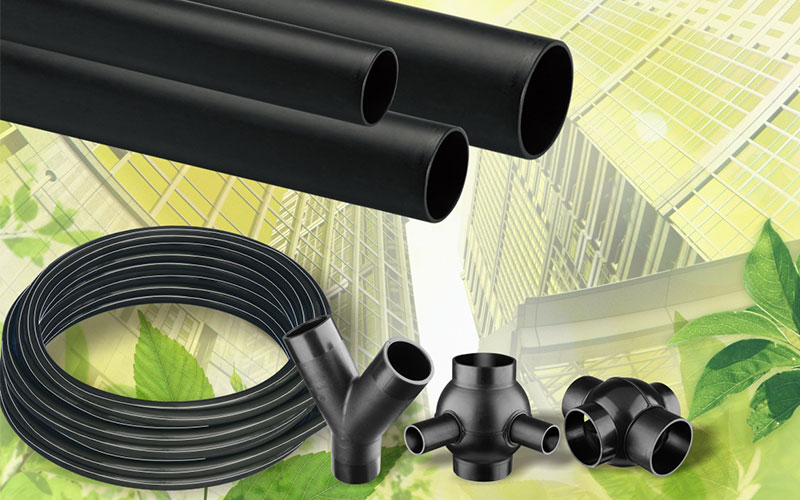custom hdpe pipe manufacturing Midland TX: Innovations Shaping the Market
Understanding the Key Benefits of HDPE Pipeline for Water and Wastewater Monitoring
The usage of HDPE pipeline in water and wastewater administration provides various advantages that warrant consideration. Its phenomenal sturdiness and lengthy lifespan make it a favored selection for lots of projects. Additionally, the product's resistance to corrosion and chemical damages improves its integrity in different atmospheres. Nevertheless, the advantages prolong past just longevity and resistance. Exploring its cost-effectiveness and environmental impact reveals much more engaging factors for its prevalent fostering in contemporary facilities
Remarkable Resilience and Durability

HDPE pipeline stands apart for its phenomenal toughness and long life, making it a preferred option in water administration systems. Created from high-density polyethylene, these pipelines can endure considerable stress and stress, making certain dependable efficiency over time. Their durable nature allows them to sustain extreme environmental conditions, consisting of temperature variations and dirt movements, which can create other materials to fall short.
The life expectancy of HDPE pipes frequently goes beyond 50 years, supplying an affordable remedy for districts and sectors alike. Furthermore, the material's lightweight buildings streamline setup, decreasing labor costs and timeframes. This resilience minimizes the demand for regular repair services or replacements, further boosting its financial charm.
In water management applications, the reliability of HDPE pipes means less disturbances and improved service connection, making them important to lasting infrastructure growth. The combination of toughness and durability strengthens HDPE's function as a cornerstone in reliable water management remedies.

Resistance to Rust and Chemical Damage
While many products catch rust and chemical damages with time, HDPE pipes show exceptional resistance, making them suitable for different water management applications. This strength stems from the molecular framework of high-density polyethylene, which is naturally non-reactive and does not wear away like metals or degrade from exposure to harsh chemicals. Because of this, HDPE is highly efficient in settings with aggressive compounds, such as wastewater systems that might consist of acids, bases, and organic solvents.
Furthermore, HDPE pipelines can endure ecological variables such as soil acidity and saline conditions, better improving their viability for diverse applications (American Plastics HDPE Pipe for Oilfield). Their ability to keep architectural stability over time minimizes the danger of leakages and failures, which is crucial in making sure the security and reliability of water distribution and wastewater administration systems. The resistance to deterioration and chemical damages substantially adds to the general effectiveness and long life of HDPE piping remedies.
Cost-Effectiveness and Financial Benefits
When thinking about the monetary effects of water administration systems, the cost-effectiveness of HDPE pipelines comes to be noticeable. These pipelines supply reduced installment and upkeep costs compared to standard materials like steel or concrete. Their lightweight nature streamlines transport and installation, causing minimized labor costs. Additionally, HDPE pipelines display a lengthy lifespan, frequently exceeding half a century, which translates to less replacements and lasting cost savings.
Moreover, the resistance of HDPE to corrosion and chemical damages reduces the demand for expensive repairs and substitutes. The pipelines likewise sustain reliable water circulation, lowering power expenses connected with pumping systems. By mitigating leakages and water loss, HDPE pipelines add to significant economic benefits for communities and sectors alike. In general, the preliminary financial investment in HDPE piping can generate substantial monetary returns over the life expectancy of the water management system, making it a prudent option for lasting framework growth.
Ecological Sustainability and Reduced Impact

Versatility and Flexibility in Setup
Due to their one-of-a-kind buildings, HDPE pipes supply impressive flexibility and flexibility in installment, making them suitable for a wide variety of applications. Their lightweight nature enables much easier handling and transport, lowering labor costs and installation time. HDPE pipes can be curved and formed to fit numerous surfaces and task demands, which is specifically beneficial in challenging environments.
Furthermore, their resistance to corrosion and chemical damages permits installment in diverse settings without the need for specialized protective finishings. The capacity to fuse joints creates a continuous, leak-free system, boosting the overall honesty and integrity of the installation. HDPE's versatility also suits ground activity, decreasing the threat of damages in locations susceptible to changing soil. On the whole, these features make HDPE pipes not only flexible yet also a favored choice for water and wastewater monitoring systems.
Frequently Asked Inquiries
How Does HDPE Pipe Contrast to PVC in Water Management Applications?
HDPE pipeline offers superior adaptability, resistance to rust, and sturdiness contrasted to PVC. Its lighter weight promotes simpler setup, while its lengthy lifespan lowers substitute expenses, making HDPE a favored option in water administration applications.
What Is the Life Expectancy of HDPE Pipeline Under Typical Conditions?
Under normal problems, HDPE pipes can have a life-span varying from 50 to 100 years. Their durability and resistance to rust add to their long-lasting efficiency in different applications, making them a trustworthy selection for infrastructure.
Are HDPE Pipeline Recyclable After Their Life Span?
Yes, HDPE pipes are recyclable after their solution life. American Plastics HDPE Pipe for Oilfield. They can be refined and repurposed right into new products, substantially lowering environmental influence and advertising sustainability within the industry, making them an environmentally friendly option for piping options
What Is the Installation Process for HDPE Water Lines?
The installation process for HDPE pipes involves website preparation, trenching, pipeline fusion or mechanical signing official statement up with, backfilling, and stress screening. Correct techniques assure a long lasting and efficient system for transporting water and wastewater successfully.
Can HDPE Pipes Be Made Use Of for Both Potable and Non-Potable Water Solutions?
Yes, HDPE pipelines can be used for both drinkable and non-potable water supply. Their adaptability, resilience, and resistance to deterioration make them ideal for various applications, making certain safe and effective transportation of water in different contexts.